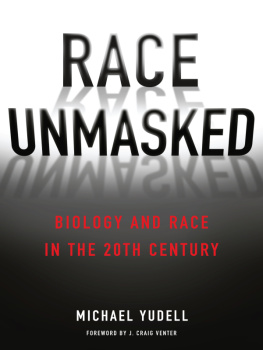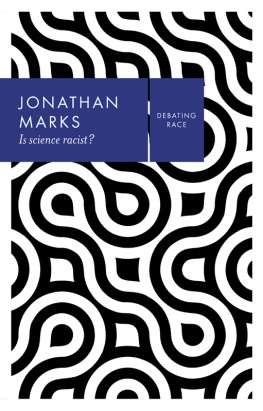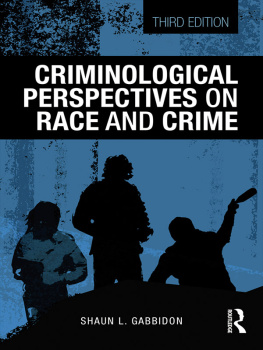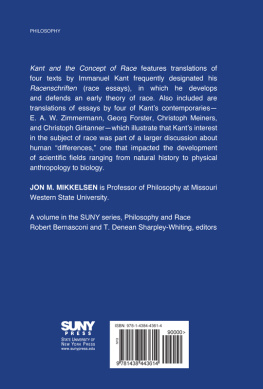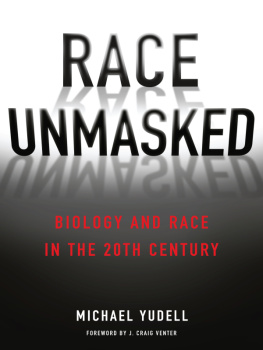RACE UNMASKED
MICHAEL YUDELL
RACE UNMASKED
Biology and Race in the Twentieth Century
FOREWORD BY J. CRAIG VENTER
COLUMBIA UNIVERSITY PRESS
NEW YORK
Columbia University Press
Publishers Since 1893
New York Chichester, West Sussex
cup.columbia.edu
Copyright 2014 Michael Yudell
All rights reserved
E-ISBN 978-0-231-53799-5
Library of Congress Cataloging-in-Publication Data
Yudell, Michael.
Race unmasked : biology and race in the twentieth century / Michael Yudell.
pages cm
Includes bibliographical references and index.
ISBN 978-0-231-16874-8 (cloth : alk. paper) ISBN 978-0-231-53799-5 (electronic)
1. EugenicsHistory20th century. 2. RaceHistory20th century. 3. Human biologyHistory20th century. I. Title.
HQ751.Y83 2014
363.9'2009'04dc23
2013043152
A Columbia University Press E-book.
CUP would be pleased to hear about your reading experience with this e-book at .
Cover design: Mary Ann Smith
References to websites (URLs) were accurate at the time of writing. Neither the author nor Columbia University Press is responsible for URLs that may have expired or changed since the manuscript was prepared.
To Gerald Gill, for all that you gave
CONTENTS
J. CRAIG VENTER, PH.D.
T he concept of race is a deeply embedded historical challenge for human societies, one that Michael Yudell clearly illustrates in this excellent book. In my research on the human genome, we have also found race to be a social construct, not a scientific one. Despite the many claims otherwise, science and scientists are not infallible or unbiased when it comes to conceptualizing race. After all, as this book shows, some very notable scientists, even some from recent history, have espoused scientific theories to support their racial beliefs. Classification of species has been a part of science for centuries; thus scientists have struggled with these ideas for centuries.
Only recently, however, have we learned to measure the genetic code quantitatively and acknowledged that most of the previous classification was based primarily on visual differences. This type of behavior is clearly a human trait. We like people who look like us. We view the same as safe and reinforcing, and difference as foreign and potentially dangerous. One of the many ironies of this overly simplistic, crude classification system is that at some point in human history there may have been a selective advantage for being wary of the potentially disease-carrying stranger coming to your cave, village, or town. Perhaps that is one reason such narcissistic genetic traits are with us today. Yet despite these tendencies toward self-liking, our genomes show evidence of extensive interbreeding going back tens of thousands of years.
One of the reasons I moved into molecular biology and genomics is that it is a quantitative field. You either have the DNA sequence or you dont. It is either accurately measured or it is not. And the discovery that our genetic code carries within each of us our entire genetic history, as well as human evolutionary history, permits for the first time a quantitative basis for deciphering our history, our evolution, and our similarities with and differences from each other.
All modern humans originated in Africa, but some Africans migrated out 300,000 to 400,000 years ago and evolved into the Neanderthals. Not that long ago, it was a hotly debated question whether Neanderthals and modern humans interbred. Based on the incredible work of Svante Paabo and colleagues sequencing several Neanderthal genomes from bone fragments found in the Vindija Cave in Croatia, we now know that a group of modern humans that migrated out of Africa interbred with Neanderthals between 40,000 and 90,000 years ago. Paabos findings show that 1 to 4 percent of the genomes from East Asians and Europeans are of Neanderthal origin. Neanderthal genes contributed changes in skin and hair that perhaps helped these populations adapt to colder climates.
The Neanderthalmodern human interactions are only a single example of how human populations have interacted and intermixed throughout history. Hellenthal and colleagues reported this year in the journal Science (343 [2014]: 747751) that admixture has been an almost universal force shaping human populations. Their work also highlights the impact of the Mongol empire, the Arab slave trade, and the Bantu expansion in influencing humanitys genetic code.
Our genomes have been mixed and remixed with every generation, so much so that the notion of any pure human population is absurd. In my talk at the White House in 2000 to announce the completion of the first draft of the human genome, I said that race has no basis in the genetic code. The results of genome sequencing over the last thirteen years only prove my point more clearly. It is a fact that there are greater genetic differences between individuals of the same racial group than between individuals of different groups. The problem we face with the emergence of so-called race-based medicine is the same problem as with applying average or normal clinical values to any individual. They just dont work well.
Genomics is about understanding that the uniqueness of each and every one of us cannot be determined by the broad general groups to which we appear to belong. Generalizations might work for clinical values and for populations, but not at the individual level. As human genome sequencing becomes a standard part of clinical practice over the next few decades, we will find that we all belong to a multitude of different human populations in terms of disease risk, drug responses, and differences in drug metabolism. Some of these differences might date back to the Neanderthalmodern human mating that increased the risk for Type 2 diabetes over that of people who came out of Africa much later. Or they could derive from ancestors from Bedouin tribes whose lifestyle selected for Type 2 diabetes as a survival advantage.
We know that with all the admixture that has occurred throughout human history, skin color will not predict what will be found in your genetic code. Race and race concepts will not stand the test of time. The socially driven attitudes and biases that have for too long found a home in science will slowly be replaced. Unfortunately, in the case of the scientific race concept this has indeed happened slowly.

